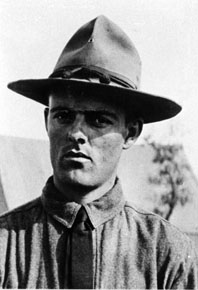Biographical Notes reCharles A. (Chuck) StoneAttached Memorial Day Letter toPage 1 of 5 Pages, of Chapter 13,THE LINDBERGH LEGACY
|
 |
|||||||||
|
ca 1917 |
||||||||||
| Memorial Day, 1981
Dear Uncle Herb, In the past few months I have been going through some old family records and heirlooms in an effort to help my sister reduce her collection of memorabilia to the point where she can move into smaller quarters. In this process, I have assembled a part of your collection of World War I photographs, documents and books which we hope to eventually donate to the Minnesota Military Museum located at Camp Ripley, near Little Falls, Minnesota. As I look over your treasured collection my mind is flooded with memories of the many times, as a small boy, I would visit your room and explore the many interesting things found on your book shelves and walls. Many of these illustrated your combat experience in the Field Artillery. I especially remember your telling of the time when your French 75 Cannon Crew volunteered to remain to fire the gun while your comrades fell back, temporarily, in the face of an impending mustard gas attack. You did this knowing that one of the eye pieces of your gas mask was broken, leaving the even stronger possibility that you would be gassed. The heroism of your crew is documented in the award of the Silver Star for gallantry in action. It is also noted in the historical records and writings of the Rainbow Division. While viewing a film during attendance at a special military training school in Oberammergau, Germany, in 1967, I was struck speechless when you suddenly appeared on the movie screen dressed in hospital pajamas, in the process of recovering from your injuries. The subject of the film related to early uses of poison gas in warfare. One of the strongest impressions I have retained from those early conversations about your war experiences is that you felt a deep sense of pride in what you and your comrades had accomplished. Never once did I pick up a trace of bitterness or hate as you recalled those trying events or the illness that haunted you for years following the war’s end. I have just come across a document from your collection which sheds some light as to why this is true. It is a letter of farewell from your Commanding Officer. Permit me to read it back to you in the spirit of this Memorial Day reminiscence. |
||||||||||
|
“To My Comrades in Arms: You have served in a Regiment that has been engaged in all the activities of America’s part in the great World War. From Baccarat to Sedan you have fought, never having been forced one foot to the rear, and never having lost a gun or a prisoner taken. You have gained every objective demanded of you and on time. Generals of two great fighting nations have mentioned you in orders. Some have made the supreme sacrifice and their graves now hallow the soil of a foreign land. Your achievements have been abreast of the best artillery men of the world — you have made the record of your regiment magnificent. I have been your Colonel during every hour of the life of the regiment, and your faithful and distinguished service has taught me from the first my one prayer that I might do my part — ‘God, make me worthy of my regiment.’ You are leaving the service with a record of which you can well be proud and wherever you may go, in whatever walk of life, I can wish nothing better for you than that your future will be as brilliant as the time spent in the service of your country. No honor the future can have in store for me can ever be as great as having been your Colonel, and with all the lasting affection of my heart, I bid you farewell. George E. Leach |
||||||||||
| That is an inspiring letter, Herb, and while words can never repay you and your comrades for their services during those difficult times, they express the gratitude of our nation as a whole. There was equal heroism and gratitude when our troops marched home from World War II. As you noted in later years, our national consensus began to fade during the Korean War which followed. You missed the last war, Herb. It turned out to be the longest war in our history. They now call it the Vietnam War. One of the problems was that it took us so long to get around to actually calling it a war. Hundreds of thousands of our nation’s men and women served their country in Southeast Asia. They did their best under difficult and confusing conditions while their countrymen at home debated the validity of the cause they served. When your ship steamed into New York Harbor under the shadow of the Statue of Liberty, the whistles blew, ticker tape fell and people cheered your return. When our veterans of the Southeast Asian conflict returned, they were often ridiculed, spat upon and condemned. Worse yet, in the years that have followed, they are often ignored and certainly too little understood by their government and fellow citizens. Wherever your gallant spirit may soar, Herb, keep an eye out for George Leach. If you see him, ask him to write a letter to our Vietnam Veterans. They need a measure of appreciation, understanding, encouragement and assistance from their government and the people they served which, as yet, is largely forthcoming. Your loving nephew, Chuck |
||||||||||
|
|
||||||||||